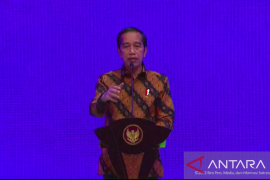"We will do anything to control inflation," Coordinating Minister for Economic Affairs Sofyan Djalil said here on Monday.
According to Djalil, the government can control inflation because the price of rice is no longer a problem. The current stock of rice is sufficient to meet demand till the next harvest season in March and April 2015.
Djalil revealed that the State Logistics Agency (Bulog) will play a greater role towards this end.
Earlier, he feared that the rising price of rice in various regions could lead to a sharp increase in inflation.
To prevent this, the government has taken anticipatory measures related to the procurement of commodities.
"As the price of rice can affect inflation significantly, the government is determined to tackle the problem," he stated here on Tuesday.
To curb the rising price of rice, he noted, the government has distributed rice to the poor (raskin).
"We asked Bulog to conduct market operations," he affirmed.
Djalil acknowledged that the rising price of rice is a result of scarcity in its supply, although Bulogs stock of 1.4 million tons of rice could be sufficient to meet demand for the next few months.
Therefore, the problem of delays in supply is expected to be resolved soon.
"We have distributed as much as 300 thousand tons of rice to the poor. Bulog must ensure the supply," the minister emphasized.
Furthermore, Djalil also pointed out that the government will take legal action against perpetrators found stocking and reselling rice illegally.
Although the price of rice has increased, that of other food commodities has not. This raised suspicion that the surge in the price of rice was caused by traders hoarding stocks of the commodity.
Moreover, the Central Statistics Agency (BPS) remarked that the rising price of staple foods such as rice, eggs, and other commodities can increase inflation pressure in February 2015.
"The prices of rice and other commodities are still high. If we look at indicators, we will find that the price of rice is still high. It (inflation) may increase in February," Deputy Head of Distribution and Service Statistics of the BPS, Sasmito Hadi Wibowo, said here on Monday.
According to Wibowo, the harvest season will boost production and supply, which will, in turn, lower the price of rice.
In addition, Social Affairs Minister Khofifah Indar Parawansa noted that the distribution of raskin can reduce rice prices by up to 60 percent.
"The timely and precise distribution of raskin can reduce rice prices by 50 to 60 percent," the minister affirmed here on Sunday.
Parawansa admitted that the governments raskin program had distributed only 45 percent of its total target of national rice distribution due to late supply in some regions.
The minister pointed out that rice stock in all Bulogs warehouses are safe and adequate, and they also have the budget. So there is no longer any reason for Bulog to not distribute raskin.
"The fluctuating prices of rice can be offset by the distribution of raskin," she stated.
According to the minister, the budget allocated for the raskin program was Rp18.8 trillion for 15.5 million targeted households, with 15 kilograms of rice per month for each household.
UU.A063/INE
EDITED BY INE/a014.
Editor: Suryanto
Copyright © ANTARA 2015











